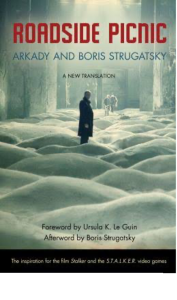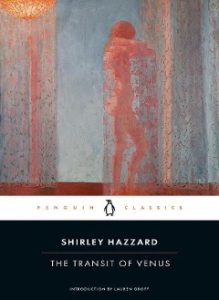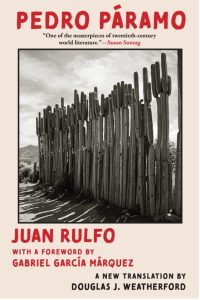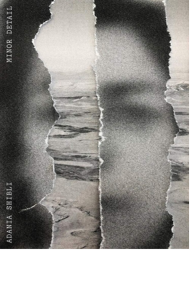Novel Seminars are intended to return us to the pleasures of classroom discussion. Participants will read the novel in advance, and then gather to discuss it, led by two people who know the novel well.
Peripatetic seminars take place during walks to open and close the conference. Organized by John Plotz and Phil Joseph, the opening seminar will take place on Thursday, May 29 and the closing one on Sunday, June 1. Please register through the conference site, but also email John Plotz (plotz@brandeis.edu) or Phil Joseph (philip.joseph@ucdenver.edu) if you are interested in participating in one of their peripatetic seminars and have any questions. These seminars are meant for all: please make Professors Plotz and Joseph aware of any mobility or accessibility constraints when expressing your interest, so that the nature of the walk/hike can be planned accordingly.
Novel and Peripatetic Seminars
Sunny Yudkoff and Tatyana Gershkovich
Arkady and Boris Strugatsky. Roadside Picnic. Originally published in Russian in 1972.

Roadside Picnic (1972) narrates the expeditions of “Red” Schuhart who ventures into one of the ominous “Zones” on earth that has been depopulated following a mysterious “Visitation” by unidentified aliens. The goal of Red’s forbidden entries is to procure not only contraband but, ultimately, the legendary “golden sphere” that will restore the health of the two groups decimated by the Visitation—children and the elderly. Co-authored by Arkady and Boris Strugatsky, the Russian novel was an immediate success. It became one of the most popular works of Soviet speculative fiction, inspiring Andrei Tarkovsky’s Stalker (1979), the 2007 video game S.T.A.L.K.E.R: Shadow of Chernobyl (2007), and sparking discussions among contemporary readers in response to the war in Ukraine. As a novel with so many afterlives, Roadside Picnic begs us to consider the questions of collective authorship and to trace how works of speculative fiction transgress borders of language, genre, and medium.
Kinohi Nishikawa and Jesse McCarthy
Shirley Hazzard, The Transit of Venus (1980)

An anglophone writer who defies easy categorization, Shirley Hazzard penned four novels between 1966 and 2003, the latter two separated by over twenty years. During that span, she also wrote nonfiction, including a memoir of her time with her husband, the translator and Flaubert scholar Francis Steegmuller. The Transit of Venus(1980), about two orphaned Australian sisters who emigrate to England in the 1950s, is exemplary of Hazzard’s style—socially perspicacious yet sensitive to the troubles of intimate and domestic life. If Hazzard is experiencing something of a revival, it may be because her art developed in an untimely relation to the literary trends of her day. This seminar reads The Transit of Venus with these situating points in mind and invites participants to encounter Hazzard along a continuum of her stylistic predecessors (George Eliot, Henry James) and her belated contemporaries (Zadie Smith, Elena Ferrante)
Ignacio Sánchez Prado and Sarah Quesada: Pedro Páramo
Juan Rulfo. Pedro Páramo. Trans. Douglas Weatherford. Grove Atlantic, 2023. Originally published in Spanish 1955.

Widely considered to be the most important and influential Mexican novel in the 20th century, Pedro Páramo has never before reached due recognition in English, as a consequence of two prior translations that failed to convey the novel’s power. In 2023, scholar Douglas Weatheford published what can be considered the definitive translation of this book. Pedro Páramo is a polyphonic ghost tale, which narrates the rise and fall of a cacique in a rural Mexican town, departing from the arrival of a man searching for his father in the town of Comala. This novel cannot be adequately captured in a short description, due to the richness of its prose and structure, a complexity contained in less than 144 pages. The book’s impact, however, is beyond dispute, from being a major influence to writers from Gabriel García Márquez to Cristina Rivera Garza, to the three film adaptations of the film, including a forthcoming one by Netflix. Weatherford’s translation allows English-language readers to finally get proper access to a book Susan Sontag called “one of the great masterpieces of the 20th century.”
Angela Naimou and Shir Alon
Adania Shibli. Minor Detail. (New Directions, 2020; translated from the Arabic by Elisabeth Jaquette). Originally published as Tafsil Thanawi / تـفـصـيـل ثـانـوي (Al-Adab, 2017)

Minor Detail is a novel arranged in two parts. The first is focalized through an Israeli battalion commander who directs the assault and murder of a Bedouin girl in August 1949 as part of ethnic cleansing operations in the Naqab desert, renamed in Hebrew as the Negev. Narrating the second part of the novel, an unnamed Palestinian woman in the West Bank in 2004 discovers a coincidence between her birthday and the 1949 events and sets out on a digressive journey to search for hidden links in the archives and roadways of colonial territory.
Minor Detail extends the experiments with fragmentation in language, politics, and sensory experience that shape Shibli’s previous two novels, Masaas (2002; translated as Touch, 2009) and Kulluna Ba’id bethat al Miqdar aan el-Hub (2004; translated as We Are All Equally Far from Love, 2012). Constellating debates in Israeli historiography with the micro-historical methods of conjecture and detection from within the Nakba, Minor Detailinvestigates the fragility of narrational strategies against ongoing erasure and oppression.
Shibli is a two-time recipient of the Young Writer’s Award by the A.M. Qattan Foundation. Minor Detail was shortlisted for the National Book Award for Translated Literature and longlisted for the International Booker Prize. The German translation from Arabic, »Eine Nebensache« by Günther Orth, won the 2023 LiBeraturpreis but became part of a pattern of evasion by cultural institutions when event organizers indefinitely postponed the award ceremony.
Peripatetic Seminars:
Speculative Fiction led by John Plotz: We will exchange ideas about speculative fiction informally, in both open and one-on-one conversations, as we perambulate. The walk will be informal and conversational (in fact, speculative!). But one way that I have done this with some success is that each person who wishes to would come prepared with a very brief account (2-5 minutes?) of what they are working on in this area. Early on in the walk we would each lay those out to the group as a whole, as a way of sparking conversation. This is an “all levels” conversational space, so you are heartily invited if you once worked on, are now working on, or may be working on speculative fiction in the future.
Novel Revivals and Kinships led by Philip Joseph: The walk’s theme draws on two recent related events: the release of Barbara Kingsolver’s Demon Copperhead (2022), her adaptation of David Copperfield, and Percival Everett’s James(2024), his rewriting of Huckleberry Finn. We consider the works as departures for discussing kinship, custodianship, activism, voice, and celebrity in contemporary novels and novel history.
